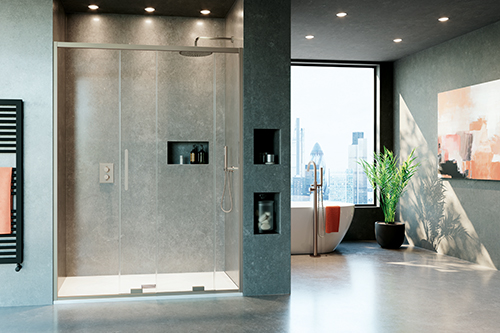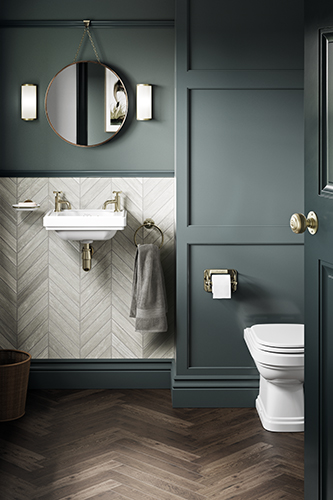Stephen Ewer took over the reins as chief executive of Bathroom Brands just days before the first lockdown last year with plans to take the business ‘to the next level’. Andrew Davies talks to him about the challenges he has faced
The pandemic has been a steep learning curve for everyone, not least Stephen Ewer (pictured), who landed the role of CEO at Bathroom Brands in April last year, just weeks after Covid-19 sent the UK into lockdown.
Ewer tells kbbreview how the company adapted to trading through the lockdowns plus the challenges with the supply chain disruptions that have plagued the KBB industry. He has dealt with a host of issues from the inital problems of Covid, to Brexit to the recent Suez Canal blockage.
He also explains why he believes customers still want a showroom experience and why, despite the growing influence of the internet, he is committed to supporting his bricks-and-mortar showroom partners as the mainstay of the buying experience.
Plus details of some new products from Burlington and Crosswater that represent a strategic shift in the company…
Q: What is the scale of the Bathroom Brands’ operation here in the UK?
A: Bathroom Brands Group is a combination of Bathroom Brands that came together with Crosswater to form the group. Current UK scale is around £80 million sales, and we operate through four power brands: Crosswater, Burlington, Britton,
and Clearwater.
Q: How was the first few weeks on the job?
A: I think one of the most overused phrases to describe the past 12 months has probably been ‘unpre-cedented’. I didn’t know what to expect. I was fortunate enough to meet with some of the senior team just a few days before lockdown, which was tremendously supportive. But I had to get my head around how to engage with the wider team, having not met most of them. We all had to orient ourselves around Zoom and Teams and actively use that tool to meet everybody and establish a business presence.
Q: Patrick Riley and David Hance shaped the company in their image. How do you continue their vision while creating your own?
A: Patrick [founder of Bathroom Brands] and Dave [founder of Crosswater] are prominent figures and big personalities within the industry and they’ve built and grown a tremendous business. I think it’s a very natural time for me to join as CEO to bring the wider business together and take it to the next level and through the next chapter. Coming in, I found excellent brands, a great team and an immense amount of experience and talent.
Q: Twelve months on, how is business at the moment?
A: If we look back through last
year, there was a very strong bounce-back in the second half. We stayed open throughout that period of the pandemic, which I think served us
as a business, and
our retail partners, well. We ended last year within touching distance of our plan, and that momentum has carried on into this year, and we’ve had an encouraging and strong start
to 2021.
I think retailers’ resilience and ingenuity to continue to trade through this period has been impressive and we anticipate there will be some further upturn
and bounce-back now that retailers have reopened.
Q: Supply and logistics have affected everybody, whether that’s because of Brexit or ships blocking the Suez Canal. What has been the effect on you?
A: We’ve experienced that as well as the rest of the industry. We’ve got a very strong team out in Asia and we have experience on the ground, with strong relationships with our shipping partners.
In addition to that, we decided as a business quite early on that, given the uncertainty that was compounded by the logistics issues, we would put further investment into stock to buffer some of the impacts of delays and difficulty forecasting through the coming months.
That contingency stock has helped us maintain high availability levels and, in turn, we’ve continued to provide a next-day service through most of this period.
Q: What is the importance and value of independent retailers to your business and your strategy?
A: Independent retail is firmly the DNA of our business. We have a really strong presence with more than 1,000 displaying outlets across the country. We have a sales team of around 35 who engage with our retail partners every day.
We’ve been busy throughout lockdown, together with our retail partners, supporting installations and new displays for when retail would reopen to the public.
Q: What is your strategy in terms of online retail?
A: Our independent research has shown that more than 80% of consumers still want to have that in-store experience. While there’s been an acceleration towards online purchasing broadly within our sector, we need to cater for that customer group.
We’ve got mechanisms in place, such as selective distribution, which work on an equivalency principle.
The standards in terms of how our brand is presented online and in-store are comparable, supporting the consumer by giving them
a choice.
In respect of independent retailers, we are upscaling our digital support with content and training, so that we can work together with independent retail to give consumers the choice still to have that in-store experience.
Some might describe that as an ‘omni-channel’ model. Still, for me, the ‘omni’ part is more about enabling the consumer on their journey, which now pretty much will always start online.
We’re using a lot of social media, influencers and dev–eloping our online content. This is used not only on our websites, but also on all our partners’ websites and social media to inspire and inform the con–sumer and direct them to their conversion point.
I go back to that statistic that more than 80% of consumers still prefer to have that in-store experience. While we see a future that will be digitally influenced, independent retailers are still going to be the mainstay of the buying experience.
Q: What lessons do you think you have learnt as a business that you’ll take away from all this?
A: I think we’ve seen alternative ways of working and alternative ways of engaging, both within the business, within our teams, and with our customers and our suppliers. Of course, that has been a point of necessity over the past 12 months and will revert to a normal way of working over the coming months.
The Bathroom Brands business is also characterised by an entre-preneurial desire and that’s come through every level of the business over the past 12 months. It’s been a real pleasure for me to join and lead a team that has been so proactive during this period.
Q: In terms of the new ranges coming out, do they represent a shift in your strategic approach?
A: We’ve undertaken a full assess-ment of the business and put a three-year plan in place. We have a major launch, Riviera, under our traditional brand Burlington, which is the first major collection launched under Burlington for a number of years.
The concept cap–tures that classic period and has also been designed to fit into modern environments. It stretches the reach of that range.
Looking at the contemporary brand Crosswater, now if you are buying a showering solution, and put in a Crossbox with the Optix 10 enclosure, all of the fixtures
are matching in colour, and we have an exact match across all the associated brassware.
It’s offering a full bathroom suite with matching colours, textures and design themes. This is being built into our new product roadmap
going forward.
Q: What is your long-term view of the market? And, how easy is it
to plan three years ahead, given the uncertainty of everything that’s happening?
A: When we look at planning, we’re talking about setting strategic objectives and priorities. You put your plans in place but, like all plans, they’re out-of-date very quickly, and they need to be adjusted.
Still, having that common purpose and those agreed strategic priorities is vital, especially when there’s quite a lot of uncertainty in the market. There’s a continued need for inde-pendent retail to remain relevant within an increasingly digital envi-ron—ment. We are committed and planning to support that.
Overall, we see the trend of what I would refer to as ‘nesting’, with an increased focus on expenditure going into the home. We see that trend as set to continue for some time. We see quite a positive outlook in terms of market development.
Of course, it’s very difficult to build into your planning the magnitude of an unexpected event like a pandemic.
However, as a business, you need to understand where you are, where you’re heading and whether you’ve got a high level of manoeuvrability – that is increasingly important in business today.
Q: Are you inclined to hold more stock than you would have done before, just in case?
A: When there is greater uncertainty, you need to build buffers. We have taken the view, and will continue to take the view, that we will hold contingency stock to smooth out some of the uncertainties and difficulty in forecasting – and some of those uncertainties in supply chains – that we’ve experienced in recent months.
I think there are further steps that we would take, together with our supply partners and our customers, to ensure that we have availability in the market and to our retailers.
But it won’t just be about holding more inventory in our warehouses. It will be about putting a wider system in place across the whole supply chain.
Listen to the full episode on The kbbreview Podcast now.

